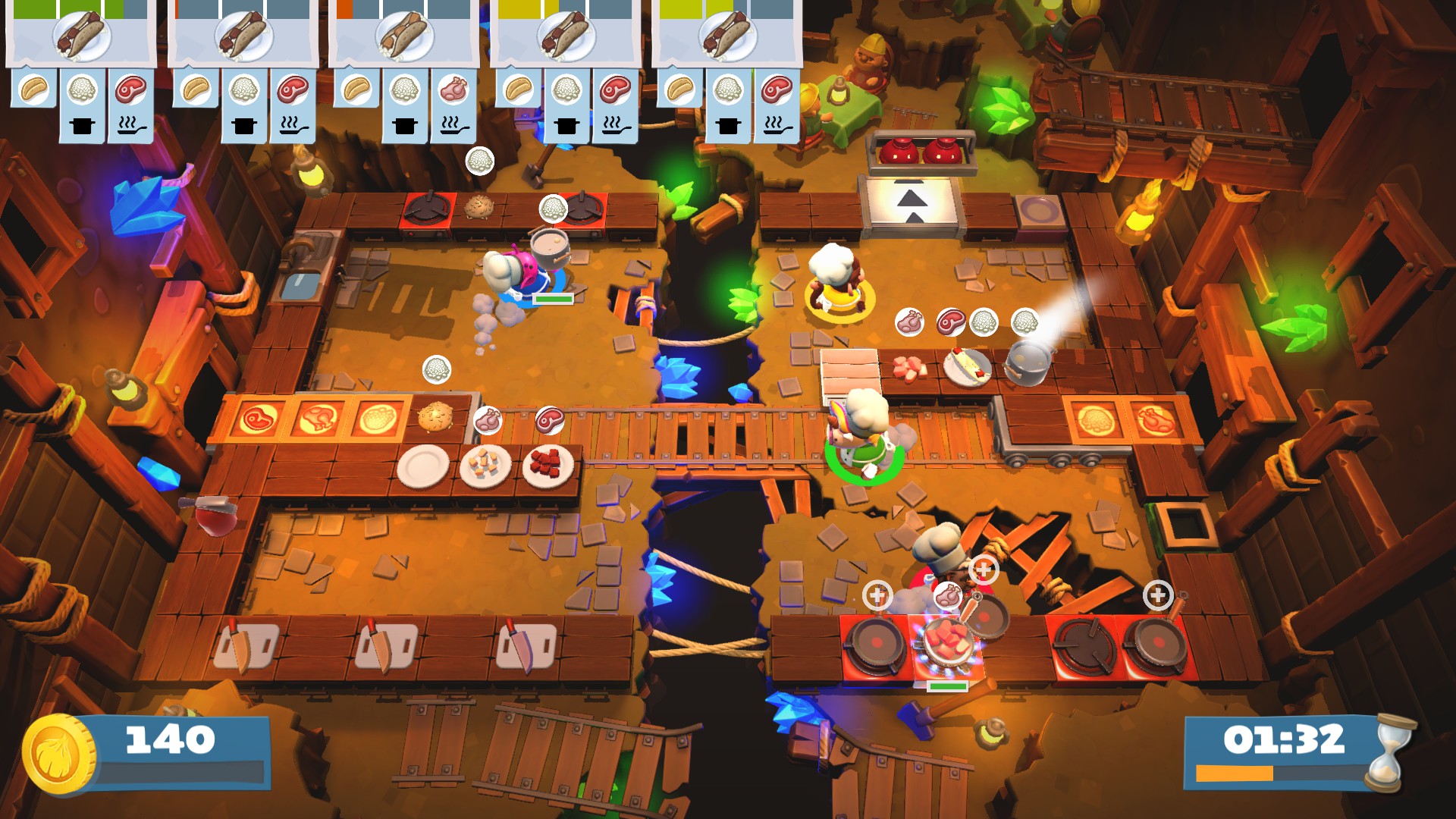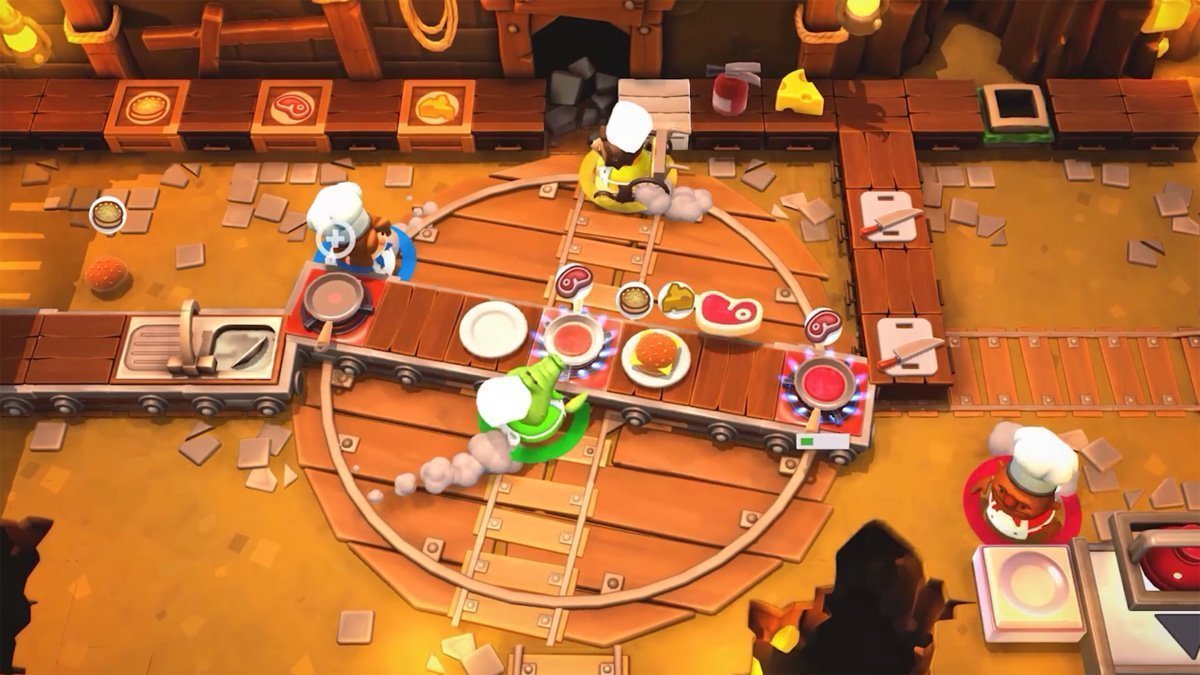I was hesitant to write about this game again, but the hold it has over me is unbelievable. Overcooked 2 , published by Team 17 and designed by Phil Duncan for Nintendo Switch, is one of the most memorable games I’ve played this year (I hope it never grows old). The developers did a fantastic job of making this co-op game challenging yet balanced.
Asymmetry in Overcooked
I believe it’s a unique challenge trying to make co-op games challenging and increasing in difficulty. In Overcooked 2, every player has the same abilities – they can carry, prepare and throw objects. One might think that adding more players will automatically make levels easier to beat. However, the developers surmounted this obstacle by changing player configurations as level difficulty increases. The beginner levels of the game allow every player to have access to all the resources and space so that players are onboarded smoothly. But as the levels get harder, you start to see certain players lose access to resources and space. Some players are grouped together while others have to work individually. Some of the resources begin to move around, so now timing becomes more important.
 No players are given automatic disadvantage unless they are unfamiliar with certain patterns or actions. But even when players are put in different configurations, the game is still balanced because every resource and action is important to being successful. If no one washes the dishes, you can’t serve the food. If no one cooks the food, you can’t plate the food. If no one prepares the ingredients, you can’t cook the food. Everyone is important.
No players are given automatic disadvantage unless they are unfamiliar with certain patterns or actions. But even when players are put in different configurations, the game is still balanced because every resource and action is important to being successful. If no one washes the dishes, you can’t serve the food. If no one cooks the food, you can’t plate the food. If no one prepares the ingredients, you can’t cook the food. Everyone is important.
Balance of Strategy
The best part about Overcooked 2 is that there are no powerful strategies. There isn’t one strategy that works for the whole game. Every level is quite unique to the point where the strategy is different every time. I believe this is why this game is so exciting because a lot of the decision-making comes from devising a strategy for the level and building on player strengths. This is how gameplay usually goes when I play with friends:
STAGE 1: free-for-all, play the game without strategizing beforehand, try out the resources and actions available, keep challenges in mind for next round
STAGE 2: try for real, assign tasks to each player, try your best to complete the task efficiently
STAGE 3: bottleneck, identify tasks that are not getting done, identify players who need help, think of new strategies or switch players around
STAGE 4: iterate until we beat the level!
Of course, it’s sometimes rewarding when you are able to beat the level after stage 1. But, most of the time it’s really fun iterating through all of the sub-optimal strategies until one works. We can also teach new actions and patterns to each other if the game seems to be unbalanced. There is also a challenge of making sure everyone feels included. Often, there might be strategies that work better where only 3 players are working out of the 4. However, I believe that the levels give the players sufficient tasks to do where all players can be doing something meaningful. On top of the that, the scores scale up to how many players are playing. So, it takes more orders to get a higher score when you have more players. Just more examples that encourage balance in strategy. 
Quick note on stage 3: if I had to change anything about the game, it would be to easily move player positions around instead of having to switch controllers like Wii Sports tennis.
Balance of Game Objects
Simply, all objects have equal importance to the success of the level. If there was any imbalance, it would be that some ingredients take longer to cook than others. For example, rice and pasta takes way longer to cook than burger meat. However, every player has to deal with these limitations so I say there isn’t much imbalance here.
Transitive, Intransitive, and Fruity
These concepts are hard to reason about in Overcooked 2 because everything happens in a logical progression. Dishes are prepared in the same way every time adding ingredients here and there. So, if one task in the chain is not done, it affects the rest of the chain. Players are racing against the clock and trying to get dishes prepared as soon as possible. The quicker they turn in the dish, the more points they receive. Because of all of this, I would say transitive and intransitive relationships are less applicable in Overcooked 2. Fruity seems to be a more proper definition as it’s difficult to compare the objects to each other. The cost mostly comes from timing and whether certain tasks take longer than others given everything in context.
Summary
Balanced. Challenging. Lots of fun. I will be playing Overcooked when I’m old.



